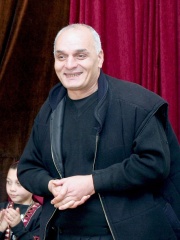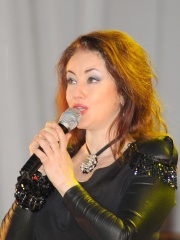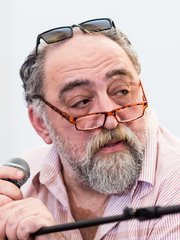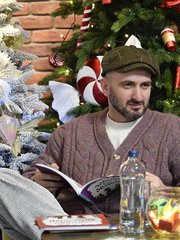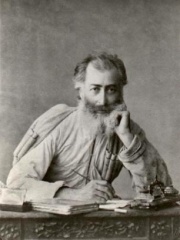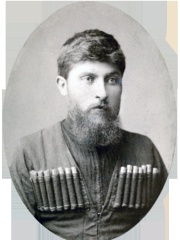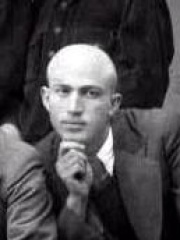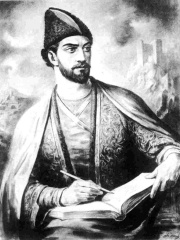
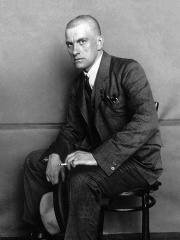
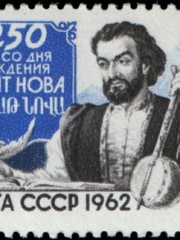
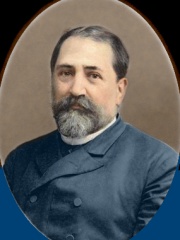
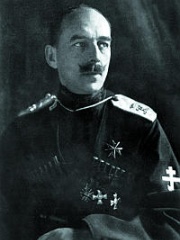
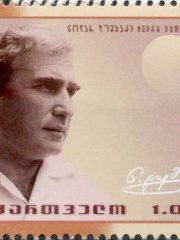
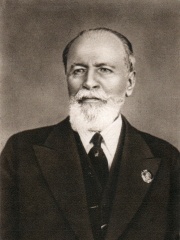
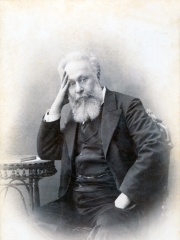
The Most Famous
WRITERS from Georgia
Top 10
The following people are considered by Pantheon to be the top 10 most legendary Georgian Writers of all time. This list of famous Georgian Writers is sorted by HPI (Historical Popularity Index), a metric that aggregates information on a biography's online popularity. Visit the rankings page to view the entire list of Georgian Writers.

1. Shota Rustaveli (1172 - 1216)
With an HPI of 77.21, Shota Rustaveli is the most famous Georgian Writer. His biography has been translated into 79 different languages on wikipedia.
Shota Rustaveli (Georgian: შოთა რუსთაველი, c. 1160 – after c. 1220), mononymously known simply as Rustaveli, was a medieval Georgian poet. He is considered to be the pre-eminent poet of the Georgian Golden Age and one of the greatest contributors to Georgian literature. Rustaveli was the author of The Knight in the Panther's Skin, a Georgian national epic poem.

2. Vladimir Mayakovsky (1893 - 1930)
With an HPI of 76.22, Vladimir Mayakovsky is the 2nd most famous Georgian Writer. His biography has been translated into 83 different languages.
Vladimir Vladimirovich Mayakovsky (19 July [O.S. 7 July] 1893 – 14 April 1930) was a Russian poet, playwright, artist, and actor. During his early, pre-Revolution period leading into 1917, Mayakovsky became renowned as a prominent figure of the Russian Futurist movement. He co-signed the Futurist manifesto, A Slap in the Face of Public Taste (1913), and wrote such poems as A Cloud in Trousers (1915) and Backbone Flute (1916). Mayakovsky produced a large and diverse body of work during the course of his career: he wrote poems, wrote and directed plays, appeared in films, edited the art journal LEF, and produced agitprop posters in support of the Communist Party during the Russian Civil War of 1917–1922. Though Mayakovsky's work regularly demonstrated ideological and patriotic support for the ideology of the Bolsheviks and a strong admiration of Vladimir Lenin, his relationship with the Soviet state was always complex and often tumultuous. Mayakovsky often found himself engaged in confrontation with the increasing involvement of the Soviet state in cultural censorship and the development of the State doctrine of Socialist realism. Works that criticized or satirized aspects of the Soviet system, such as the poem "Talking With the Taxman About Poetry" (1926), and the plays The Bedbug (1929) and The Bathhouse (1929), met with scorn from the Soviet state and literary establishment. In 1930, Mayakovsky committed suicide. Even after death, his relationship with the Soviet state remained unsteady. Though Mayakovsky had previously been harshly criticized by Soviet governmental bodies such as the Russian Association of Proletarian Writers, Premier Joseph Stalin described Mayakovsky after his death as "the best and the most talented poet of our Soviet epoch".

3. Sayat-Nova (1712 - 1795)
With an HPI of 71.95, Sayat-Nova is the 3rd most famous Georgian Writer. His biography has been translated into 39 different languages.
Sayat-Nova (Armenian: Սայեաթ-Նովայ (сlassical), Սայաթ-Նովա (reformed); Georgian: საიათნოვა; Azerbaijani: سایاتنووا; Persian: سایاتنووا; born Harutyun Sayatyan (Armenian: Հարություն Սայաթյան); 14 June 1712 – 22 September 1795) was an Armenian poet, musician and ashugh, who had compositions in a number of languages.

4. Ilia Chavchavadze (1837 - 1907)
With an HPI of 67.67, Ilia Chavchavadze is the 4th most famous Georgian Writer. His biography has been translated into 55 different languages.
Tavadi (Prince) Ilia Chavchavadze (Georgian: ილია ჭავჭავაძე; 27 October 1837 – 12 September 1907) was a Georgian journalist, publisher, writer and poet who spearheaded the revival of Georgian nationalism during the second half of the 19th century in the period of Tsarist rule. He has been called Georgia's "most universally revered hero" and the "Father of the Nation." He was a leader of contemporary youth intellectual movement named "Tergdaleulebi" which spread modern and European liberal ideals in Georgia. Chavchavadze founded two modern newspapers: Sakartvelos Moambe and Iveria. He coined the phrase "Ena, Mamuli, Sartsmunoeba" ("Language, Homeland, Faith"), a slogan of Georgian nationalism. After the 1905 Russian Revolution Chavchavadze was elected as a representative of the Georgian nobility to the imperial State Council. Chavchavadze was killed in Tsitsamuri, near Mtskheta, by a gang of assassins. In 1907 he was canonized as Saint Ilia the Righteous (წმინდა ილია მართალი, tsminda ilia martali) by the Georgian Orthodox Church.
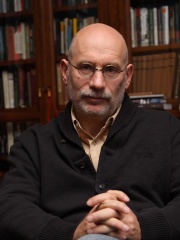
5. Boris Akunin (b. 1956)
With an HPI of 64.27, Boris Akunin is the 5th most famous Georgian Writer. His biography has been translated into 49 different languages.
Grigori Chkhartishvili (Russian: Григорий Шалвович Чхартишвили, romanized: Grigoriy Shalvovich Chkhartishvili; Georgian: გრიგორი ჩხარტიშვილი), better known by his pen name Boris Akunin (Russian: Борис Акунин, born 20 May 1956), is a Georgian and Russian writer residing in the United Kingdom. He is best known as a writer of historical fiction, specifically his Erast Fandorin detective novels. He is also an essayist and literary translator. Grigory Chkhartishvili has also written under pen names Anatoly Brusnikin, Anna Borisova, and Akunin-Chkhartishvili. His characters include Erast Fandorin, Nicholas Fandorin and Sister Pelagia.

6. Pavel Bermondt-Avalov (1877 - 1974)
With an HPI of 63.15, Pavel Bermondt-Avalov is the 6th most famous Georgian Writer. His biography has been translated into 24 different languages.
Prince Pavel Rafailovich Bermondt-Avalov (Russian: Павел Рафаилович Бермондт-Авалов) or Prince Avalov (16 March [O.S. 4 March] 1877 – 27 December 1973) was a Russian officer and Cossack adventurer-warlord. He is best known as the commander of the West Russian Volunteer Army which was active in present-day Latvia and Lithuania in the aftermath of World War I. Born into a Georgian-Russian family, Avalov received a musical education in Warsaw and joined the Russian Imperial Army's Baikal Cossacks host as a musical conductor. He participated in the Russo-Japanese War, during which he was awarded the Cross of St. George. After converting to Orthodoxy, he was transferred to the Ussuri Cossacks and was promoted to cornet. During the First World War, Avalov worked as a personal adjutant for Pavel Mishchenko, serving in Eastern Prussia and Galicia. Throughout his military career, Avalov was injured seven times. After being demobilized in 1917, Avalov became involved in the Russian Civil War as an ardent supporter of the White Army. After defending Kiev from Symon Petliura, Avalov was captured and later exiled into Germany, where he formed a unit to fight the Bolsheviks in the Baltic States, along with general Rüdiger von der Goltz's Baltische Landeswehr. While fighting in Latvia and Lithuania to establish a pro-German and anti-Bolshevik territorial union, Avalov's West Russian Volunteer Army, also called the Bermontians, raided and pillaged the countryside and its occupied areas. After suffering defeats in Riga and Radviliškis, Avalov's army was severely damaged and subsequently retreated into Germany. In Germany, Avalov participated in right-wing White émigré movements, strongly supporting Adolf Hitler's Nazi Party. Despite this, he was imprisoned and sent to a concentration camp for embezzling funds meant for his Russian National Socialist Movement. Avalov escaped to Italy through Switzerland, later relocating to Belgrade before finally emigrating to the United States and living there until his death.

7. Nodar Dumbadze (1928 - 1984)
With an HPI of 63.03, Nodar Dumbadze is the 7th most famous Georgian Writer. His biography has been translated into 26 different languages.
Nodar Dumbadze (Georgian: ნოდარ დუმბაძე, July 14, 1928 – September 4, 1984) was a Georgian writer.

8. Vladimir Nemirovich-Danchenko (1858 - 1943)
With an HPI of 62.92, Vladimir Nemirovich-Danchenko is the 8th most famous Georgian Writer. His biography has been translated into 34 different languages.
Vladimir Ivanovich Nemirovich-Danchenko (Russian: Владимир Иванович Немирович-Данченко; 23 December [O.S. 11 December] 1858 – 25 April 1943) was a Soviet and Russian theatre director, writer, pedagogue, playwright, producer and theatre administrator, who founded the Moscow Art Theatre with his colleague, Konstantin Stanislavski, in 1898.

9. Akaki Tsereteli (1840 - 1915)
With an HPI of 62.05, Akaki Tsereteli is the 9th most famous Georgian Writer. His biography has been translated into 32 different languages.
Count Akaki Tsereteli (Georgian: აკაკი წერეთელი) (1840–1915), often mononymously known as Akaki, was a prominent Georgian poet and national liberation movement figure.
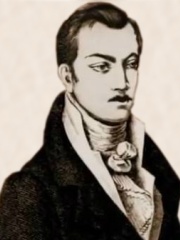
10. Nikoloz Baratashvili (1817 - 1845)
With an HPI of 61.38, Nikoloz Baratashvili is the 10th most famous Georgian Writer. His biography has been translated into 33 different languages.
Prince Nikoloz Baratashvili (Georgian: ნიკოლოზ ბარათაშვილი; 4 December 1817 – 21 October 1845) was a Georgian poet. He was one of the first Georgians to marry modern nationalism with European Romanticism and to introduce "Europeanism" into Georgian literature. Due to his early death, Baratashvili left a relatively small literary heritage of fewer than forty short lyrics, one extended poem, and a few private letters, but he is nevertheless considered to be the high point of Georgian Romanticism. He was referred to as the "Georgian Byron".
People
Pantheon has 37 people classified as Georgian writers born between 500 and 1984. Of these 37, 7 (18.92%) of them are still alive today. The most famous living Georgian writers include Boris Akunin, Roy Medvedev, and Miho Mosulishvili. The most famous deceased Georgian writers include Shota Rustaveli, Vladimir Mayakovsky, and Sayat-Nova. As of April 2024, 2 new Georgian writers have been added to Pantheon including Aka Morchiladze, and Giorgi Kekelidze.
Living Georgian Writers
Go to all RankingsBoris Akunin
1956 - Present
HPI: 64.27
Roy Medvedev
1925 - Present
HPI: 60.74
Miho Mosulishvili
1962 - Present
HPI: 55.19
Tamara Gverdtsiteli
1962 - Present
HPI: 51.43
Nino Haratischwili
1983 - Present
HPI: 47.48
Aka Morchiladze
1966 - Present
HPI: 43.73
Giorgi Kekelidze
1984 - Present
HPI: 38.26
Deceased Georgian Writers
Go to all RankingsShota Rustaveli
1172 - 1216
HPI: 77.21
Vladimir Mayakovsky
1893 - 1930
HPI: 76.22
Sayat-Nova
1712 - 1795
HPI: 71.95
Ilia Chavchavadze
1837 - 1907
HPI: 67.67
Pavel Bermondt-Avalov
1877 - 1974
HPI: 63.15
Nodar Dumbadze
1928 - 1984
HPI: 63.03
Vladimir Nemirovich-Danchenko
1858 - 1943
HPI: 62.92
Akaki Tsereteli
1840 - 1915
HPI: 62.05
Nikoloz Baratashvili
1817 - 1845
HPI: 61.38
Alexander Kazbegi
1848 - 1893
HPI: 61.36
Vazha-Pshavela
1861 - 1915
HPI: 61.14
Grigol Abashidze
1914 - 1994
HPI: 60.38
Newly Added Georgian Writers (2025)
Go to all RankingsOverlapping Lives
Which Writers were alive at the same time? This visualization shows the lifespans of the 24 most globally memorable Writers since 1700.


